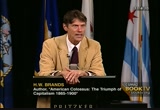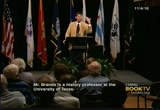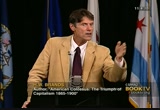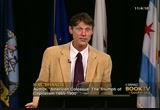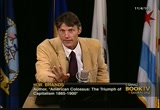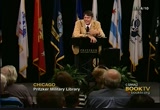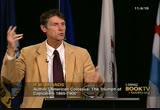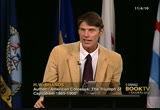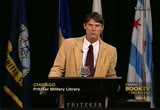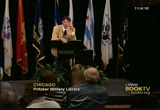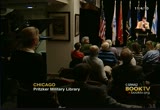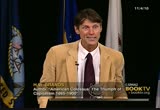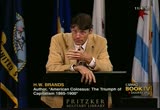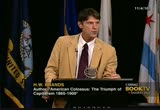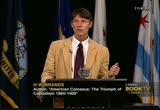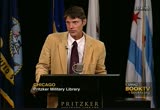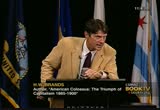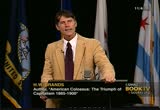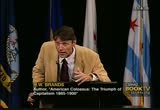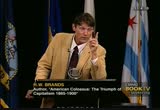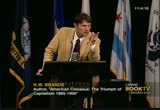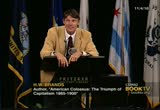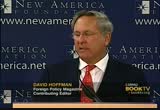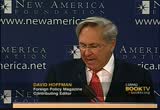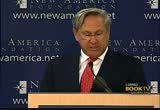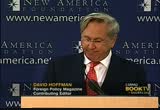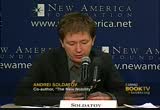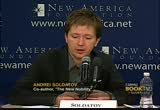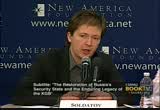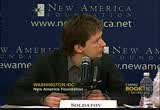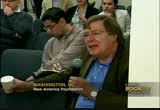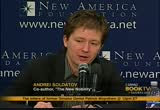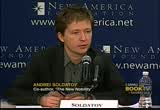tv Book TV CSPAN January 15, 2011 9:00am-10:00am EST
9:00 am
could still come, but chinese layers had been -- laborers had been barred, and the japanese were conspicuously distancing themselves from china. china was on a downward trajectory, this in the thinking of japan and most westerners as well, japan was on an upward trajectory, and furthermore, the jalapeno -- japanese were trying to accomplish this by self-consciously mimicking the ways of the west. so if the west had then -- the united states in particular -- turned it back on japan and said we will treat you no were betten we treat the chinese, this would have alienated the japanese. now, you have to be a little bit careful in the figuring out how to interpret this because, yeah, the japanese diplomats, japanese leaders said this will be an intolerable affront.
9:02 am
roosevelt did not want to antagonize the japanese. as roosevelt discovered, roosevelt was one of the strong advocates of annexation of the philippines. in 1898-1899 it seemed like a really good idea. what he did not appreciate was the american people were -- i might even say are -- essentially anti imperialists at heart. americans never, not from 1899 until 1946, never sufficiently garrisoned the philippines against potential attack. japan was the expansionist country in that part of the world so roosevelt by 1905 was describing the philippines, his term was our heel of achilles. it is all that gives us concern
9:03 am
interrelationships with japan. it was an american colony but it was indefensible if the japanese made a concerted attack and the philippines which is why roosevelt had to deal very gently with the japanese and i'm not sure if there was another agreement. i don't know of a secret creek you might be talking about. >> i am curious about the current state of this country, manufacturing, outsourcing, robotics, and the american dream. weather young people going to do if they can't go to work, the deficit. what is your prognosis for the future? >> on or respond to that question in two way is. first are will say i describe this period of american industrialization we pursue emergence of modern capitalism. at described it began with the war. the period i talk about clothes as the war but that war becomes
9:04 am
a regular feature of american life through the 20th-century and i would say -- you are free to disagree but i would say that america's economy, modern economy has never demonstrated an ability to thrive in the absence of high military spending. look at times when the united states was not spending a lot on the military, between world war 1 and world war ii and ten years and that is the great depression which is not a good indicator. in 1945 spending on the military has been consistently quite high. those american leaders responsible for the transition from world war ii to the piece that was supposed to follow gravely concerned. they knew perfectly well that it was the federal spending during wartime that pooled the country out of the depression and ask themselves what happens when we pull the plug on the federal
9:05 am
spending. are we going to go back into a depression. they were seriously concerned and one of the measures they took to try to insure that not happen was embraced for the first time in a consistent serious way by the american government free trade because they hearkened back to the 1890s when there was a belief in foreign markets. lee atkinson in 1944, secretary of state for economic affairs. he went before congress and said we can't figure out to run the congress without access to foreign markets. this was primarily behind american decision in favor of free trade. hi am calling the modern golden age of the united states. the two decades from 1945 to 1965. i called as the golden age for two reason. one is for people of my generation -- i was born in
9:06 am
1953. folks who were running the country these days, these are the years of our childhood and there is this recurrent tendency of humans to look back to a golden age and if you quiz people, the golden age usually corresponds roughly with their childhood. when life was simpler. of course was life was simpler. you were 8 years old. if we could just get back to the way the country was in 1950 or 1960 them all would be well so part of it is this individual nostalgia. part of a also is the historically anomalous position of the united states during this period because in a fundamental way the united states was the only victor of world war ii. it was the only country that came out with a stronger economy than when it went in. america's principal industrial competitors were either gravely
9:07 am
weakened like britain or absolutely demolished like germany and japan. so it was easy for the united states to embrace free trade. level the playing field. already leveled the capacity of our competitors and so for 20 years until the german and japanese economy in particular got back on their feet personal free trade worked to our benefit. and big companies like general motors could agree to big deals with the united autoworkers knowing there was no competition. if you were buying a car and the united states in 1955 was going to be a detroit built, are. so there was this period -- it was a golden age of the american political economy and it was a time when somebody could graduate high-school and go to work in a steel mill in pittsburgh with no more education than high school have a solid blue-collar middle-class
9:08 am
existence because americans were competing only with themselves. and there is this belief that if somehow we could get back to that time whether you are supporter of organized labor or one breadwinner, whatever you are thinking of is not going to happen because it was this moment of historical anomaly. it wasn't by virtue or particular productive nest of the american economy. it was because the rest of the world was flat on its back and rest of the world was eventually going to come up. we point out organized labor. there were two decades in american history where industrial unions were strong and those of the two decades in this period. before the second world war industrial unions had a difficult time. they were engaged in strikes. had to deal with unfriendly courts. they could not make much of a
9:09 am
dent. then there was the period from 45 to 65 because there was this unspoken bargain between big unions and big corporations because they could get good deals and corporations have capacity for their consumers because they had no choice but once consumers could start buying nissans and leos there was a police and the industrial unions, the deal breaks down so when americans complain about globalization it is partly globalization but partly the fact that the world of today is not a world of 1950 and it couldn't be, now it gets destroyed by world war ii. and now you want to have world war iii and do all over again. no one is recommending that. >> woodrow wilson's war that they're referring to is world war ii. and the faces of the book, had
9:10 am
not woodrow wilson engineered congress to declare war on germany in 1917 the balance of power would have been what remained in europe and there wouldn't have been the rise of hitler in world war ii. to get your opinion and that. >> that is an interesting countercheck to will. i find counterfactual history to be interesting and instructive but for no more than six months or a year beyond when you diverge from what actually happened. because then it becomes degrading. you have no way of knowing what would have happened. a haven't heard of this argument in detail but one supposes then that if germany wins world war i without american intervention that there is no rise of hitler and nazi party -- maybe.
9:11 am
. if hitler had been run over by an austrian streetcar things would have been different too. i don't know what to make of that. >> the secret understanding was america looking the other way when japan invaded korea, 1904 -- i am sorry? i don't know anything like that. >> the american secretary of war. >> there's a book written about that when this information was declassified. case of japan as westernized. that was a passive fire. you can invade korea. we will look the other way. >> to some extent that might well be true. roosevelt did consider japan at least until 1904 to be a force
9:12 am
for progress and good in east asia but there was also a coldly pragmatic calculation. if japan is going to invade korea what is the united states going to do about it. most americans had no idea where career was and the thought that americans should go into battle for korea would have boggled anybody's mind. if this had been presented as a work ahead of time to conquer the philippines it would have gotten absolutely nowhere. the only way americans could accept this projection of american power beyond american shores, first time with the barbary wars in the nineteenth century. first time americans projected power beyond american shores is 1898 and partly because we could afford to and partly because it was only 90 miles from florida.
9:13 am
of someone said we need to protect american power 9,000 miles across the -- everyone would serve said you needed have your head examine. even william mckinley had to get on a map to figure out whether the philippines were. remember when you heard of the invasion of grenada in 1983 and the first thing of the newscasters had to figure out was where in the world is. this was the reaction of americans to the news that, or do we have won the first battle of the war because everyone was looking towards cuba. the philippines are way over there. the basic american attitude toward east asia from 1895 -- the first sign a japanese war. when they take over china and win this is a surprise to a lot of people because it is really big. japan is a country we need to
9:14 am
pay attention to. nothing more than a very briefly 89 b-1899 the state department issued the opened door note and this is simply a statement of america's hope that the imperial powers not carve up china to the exclusion of the united states and roosevelt's decision to try to mediate an end to the japanese war before the japanese that too strong, that was the basic and idea but that was as far as the united states would go. americans when deegan paid to garrison their own colony in the philippines which is what the united states gave it up. >> thank you so much. you describe work as fueling the american economy. and during the last few years with iraq and afghanistan we do not have work fuelling the american economy. it seems to me there are a few
9:15 am
things going on here which indicates a paradigm shift. one, americans don't have skin in the game emotionally, and there is a lot of outsourcing of what would have in the past fuelled the american economy. could you speak to this paradigm shift and how you see it playing out? >> when the federal government spends money on anything there are cost and benefits. one united states spent a lot of money to fight world war ii i described this as a stimulus to the american economy but of course it was a bar when against american's future. and essentially it was we will pack the future generations to restore economic health today. i put it this way. the economic effect is as are described. when the united states fight the war in afghanistan and iraq it does the same thing.
9:16 am
it borrows money to fuel this. there is an economic stimulus that comes from spending on the war in iraq and afghanistan. it is not as direct as was in the 1940's because much of it is spent in other countries and doesn't find its way back to the united states but there's another element probably more central and that is when the united states barrault's money today instead of borrowing money from future american generations the bar as money from foreign countries. if you are simply barring from future generations it is a debt we owe ourselves. one generation owes another but it gives no foreign country any particular leverage. or to put it another way by and large the interests of the creditors and debtors a line if there all-american. but if the creditors of the bank of japan and the bank of china and other sovereign will funds that it is unclear that the
9:17 am
interests of the creditors a line that the interest with the debtor. when the united states ran these huge deficits during 1942--41-42-45, it was some concern to the financial reminded but it came at a moment when the united states was the world's largest creditor. everybody owed the united states money. when you are a creditor you have a freedom of action you don't have when you are a debtor. united states now is far and away largest debtor in world history which seriously constraints america's freedom of action because of the chinese decide they no longer want to hold american dollars, interest rates are going to skyrocket, the dollar will get weaker and people will have to figure out what we are going to do.
9:18 am
the chinese are already making noises in that direction. they have so many dollars they won't oo for night but every time they talk about diversifying american money markets get very nervous as well they might. the biggest difference is in america's financial position with the rest of the world. when you know the rest of the world money you have to pay attention to what the rest of the world things. if you just so the money to yourselves you just go about your own business largely ignored what the rest of the world thinks. >> another factor in the wars of the late nineteenth century that the united states had an inferiority complex. many americans that there were still regarded by the europeans as a frontier country at the edges of civilization? >> very interesting question. manifestation of an interior accomplice. i'm going to answer yes and as a
9:19 am
way of illustrating this i am going to remind you of something i said in the introduction. i said in -- i live in texas. one of the things i observed about texas, texas is a lot like the rest of the united states only more so and in one respect i am thinking of in particular. there is a lot of swagger in texas and a lot of people didn't like president george w. bush. this is the way he carries and self. he swaggered like a texan. i will go ahead and use the term. in the texas national character, there is a combination of this swagger but also a clause that inferiority complex in that the rest of the country thinks that texans are bumpkins wore cowboy
9:20 am
is or something. and texans can't help but be influenced by this. part of it is great pride in being texan but also this sneaking suspicion that the rest of the country or world is not as impressed. i would contend this is something going on in the nineteenth century. i carry it to american foreign policy almost until today in some regard and that is there is the strong currents of american exceptional is some. this is the best country on earth either because god made us so or we made it so ourselves for something but at the same time there is an certainly was at least until the first world war, the first world war is a breaking point in some of this because european civilization essentially self-destructive and after that it is hard for europeans to take on any kind of a superior attitude toward america. theodore roosevelt was an anglophile and a lot of people
9:21 am
he hung up with had this notion--woodrow wilson was a great admirer of the british parliamentary system and couldn't make sense of the american presidential system despite defected he became one of the more effective american president. you're absolutely right. if the europeans are out collecting colonies almost as though americans can't decide for themselves whether we should or shouldn't. maybe that sounds too harsh. maybe we don't want colonies' today but what if they are handy in the future? if we don't act now there won't be any possibility for colonies in the future so it is a safe bet. one last thing. this has to do with countries get the foreign policy they can afford. to some extent foreign and military policy is the equivalent of an insurance policy. 100 years ago -- you may have heard of the series of terrorist
9:22 am
attacks on wall street during the years right after world war i. there was a series of bombings after another. there was a huge scare. there was a thought that many of these terrorists especially russian and anarchist's, didn't occur to anybody to think the united states ought to invade russia. if 9/11 had occurred hundred years earlier it wouldn't have occurred to anybody to invade afghanistan. certainly not to invade iraq. by the beginning of the twenty-first century the united states was so well the it could afford to take out an insurance policy. if you can attack al qaeda in afghanistan it makes it less likely al qaeda can attack us in the united states. nobody bothered to count the cost. somebody in the bush white house or the pentagon said this war -- of we go to iraq it will cost
9:23 am
$100 billion. it cost a lot more than $100 billion but nobody wanted to hear it. there was no consideration in congress about it. i will be so bold tonight as to say we are close to the end of america's war is. there are going to be any more american wars. i will back down a little bit. i am fairly confident there will be no more wars like the korean war or the vietnam war or the gulf war or the war in bosnia or the war in iraq or the war in afghanistan because those are wars that were not forced in any way upon the united states. we can argue about afghanistan but we could have just bombed the al qaeda camps and come home. we have come to the end of those wars. it started with the war of 1898 and we came to the end because we have run out of money.
9:24 am
in the twentieth century americans could have guns and butter. we can't have that. we have a hard time just having butter. one last thing. some people say social security is not going to survive. social security will become bankrupt so don't count on social security. those people are wrong. social security is the last federal programs standing. social security will be there after the pentagon has been vacated and least out to somebody else. why do i know this? every year -- every 36 months i get, you get a statement from the social security administration and what does it say? it says you have an account balance. here is your account balance at your name is right next to that and you start to think there actually is money some place in
9:25 am
washington with my name on it. if somebody takes that away, i am really going to feel hard put upon. i don't get a statement of account from the pentagon. i don't get a statement of account from the department of energy. you can cut the pentagon and i will not feel as though you took something that is owed me. dms with my social security, i will feel the pain. you know why it is that way? not that there really is an account with my name on it. franklin roosevelt in 1935 deliberately designed it that way. let's make it look like an insurance policy and he said, quote, no politician can ever take this away. and he was right and effective. [applause]
9:26 am
>> h.w. brands is the author of several books including the age of gold and the first american:the life and times of benjamin franklin which was a finalist for the pulitzer prize in biography. he is a history professor at the university of texas. for more information visit his website, h.w. brands.com. booktv is on twitter. follow as for regular updates on our programming and news on nonfiction books and authors. twitter.com/booktv. here are the best-selling nonfiction titles from amazon.com as of january 13th, 2010. rebecca salute uncovers a line of cells that led to several medical advancements in the immortal life of henry and at lax. in battle hymn of the tiger mother, amy credits a chinese
9:27 am
mother for the stereotypical success of asian children. this is number 2 on the list. cleopatra for the kendall is third. fourth on the list is the come back. how innovation will record the american dream by gary shapiro. cleopatra makes the list again at number 5 in hard cover. cindy lambert tells of her experience as a planned parenthood leader in unplanned at 6:00. racing in the rain is the no. 7 and michael lewis's the big short is 8. both of these titles are 40 kindle. at number 9 is the nl a handbook for writers of research papers. completing a list is the warmth of other sons by isabel wilkerson. >> we are at the national press club talking to christine miller about what inspired you to write
9:28 am
about president wilson's life? >> i have been writing about women and politics for the past 25 years and these two women were instrumental in the success of the wilson administration completely in a different way. ellen wilson got him to the white house and died in office. after his stroke edith wilson helped him stay in the white house. they are powerful women in their own day. >> what do the women have in common personalitywise? >> they were completely devoted to woodrow wilson and what he needed and wanted. >> was there anything surprising in your research? >> he had girlfriend too. this man was a romeo. >> did he have a girlfriend with
9:29 am
each wife or just one? >> the first wife doesn't believe it would harm him politically so she acted so the girlfriend was a family friend and basically, what did her. there's no intention of sharing him with anybody and the relationship had come to an end before she came on the scene. >> how did either or both influence his politics or policies? >> neither of them influenced his policies. he was a deep thinker not only a professor at princeton but the president of princeton. his first wife helped him write his speeches. she critiqued his speeches and told him when he wasn't being clear enough and contributed a great deal to his thinking overall. the second wife really have not
9:30 am
had that kind of education but she works very closely with him all during his presidency. when he suffered a massive stroke 18 months before the end she knew his mind so well that she was able to carry on even though he was ill. >> thank you for your time. >> andrei soldatov irina borogan, co-founders of the news web site discuss the reinvention of the kgb during vladimir putin's tenure as russian's president. they speak at the new america foundation in washington d.c.. the program is all little over an hour. >> we have to get started. i will send a limo out for anybody that couldn't get here and the metro. i am david hoffman. i am a contributing editor of
9:31 am
foreign policy magazine. we are interested in getting more visitors coming and speaking here. really did a lot to help us put this together in a short period of time. in an earlier period i was a moscow correspondent for the washington post. those of us who remember what it was like to be a correspondent even before me in times of the soviet union will recall that correspondents were prohibited from going more than 25 miles outside of moscow without permission from the authorities. it was a very difficult environment. peter osmosis is here with us that he was a correspondent in that time and remembers it more vividly than i do. even after the soviet collapse
9:32 am
when i was a correspondent in yeltsin's time there were many risks to being a correspondent. since 2017 russian journalists have been killed including many who now ball sometimes on their own or under coercion to the new authoritarianism. today we have a chance to talk to two journalists working in today's russia in this environment. what makes them special is they are real digging investigative reporters and determined to ferret out facts, to judge them, to check them and especially they are doing this in one of the most difficult fields. i know from my own experience the security services are very a
9:33 am
okay and secret. andrei soldatov and irina borogan are co-founders of their own web site. i would mention to you that there is a very nice and easy to navigating. version of this web site where you can go and see a lot of their work. a new media way to carry out their investigations when they write their articles which are published in russia. they also opposed them so people can have access to what they found as they pursue their investigation. andrei soldatov worked from 2006 to 2008 and both of them have told me -- you also both worked at russian newspapers as well including the long lamented newspapers after the collapse of the soviet union.
9:34 am
anyway, agentura.ru has posted information about security services and has appeared in western publications and noted the new york times in a headline, the web site that came in from the cold to unveil russian secrets. we are here today to talk about their new book. this is it so everyone can see the nice cover and a picture on the front. the no nobility, restoration of russian stability state and the kgb. i would like to introduce the book very briefly and we will have a lot of questions for them and they are eager to address whatever you would like to ask. in 1994, address list published a book called estate within a state. her work was finished just as the soviet union was collapsing. it was a wake-up call that even
9:35 am
though the soviet union had collapsed, the kgb was still surviving. not only surviving but thriving. the best evidence that her alarm about this was to be taken seriously is work that andrei soldatov and irina borogan present today because it is the first major investigation of the impact of these security services and their activities since this book was written 15 years ago. for most of the last decade particularly under president tuned it has been an eventful time for security services. the new nobility tells us how the end of the federal security service, the main successor agency, referred to his associates and versus services as the new nobility from which the title of the book was taken. one of the things we want to
9:36 am
talk about is what did the security services do with these blessings of resources and prestige and responsibility that putin gave them? how do they respond to the challenges? what role have they had in enforcing the new authoritarianism? and in suppressing the said? have the security services widened their operations to include overseas extrajudicial killings? what else have they been doing in this dark room? a brief word about acronyms. the kgb is all familiar with you from soviet times. the main successor to the kgb is a domestic successor, the federal security services. russian initials fsb. and we will see they have grown greatly in stature and were not
9:37 am
entirely domestic successor but there's a foreign intelligence agency also with the initials fdr. and there are other agencies which i hope andrei soldatov and irina borogan will tell us about and help us distinguish and sort out. i hope we have a really fun and interesting productive our -- a little more than an hour with them. i want to remind everybody we are kicking and filming. everything is on the record. state your questions clearly but we are a small group. we have time if you have a followup. if you want to follow up let me know and i will try to be an honest fair moderator. i will ask the first question and then turn it over and open it up. both of you i would like to ask you, one of your basic argument for this book and your findings
9:38 am
is that the fsb didn't become a small travel piece of the kgb, it became bigger and in some way is much more powerful and independent than the kgb. how did this happen and why? >> in terms of numbers, the kgb was a security service of the soviet union and the soviet union was bigger than russia. the influence in how a change the cultural russia and how they control the society and the kremlin and if we can say it now, it is more powerful mostly because the kgb is another organization, a tool for soviet communist party and at the same time the communist party, soviet
9:39 am
union fully controls the kgb because there are special budget cells. a section of the kgb. and of course in 1991 the soviet union collapsed. the idea was party control. the initial idea failed really inside the intelligence community and to have rivals for example in computers and communication agency, comparable for u.s. national security agency. possible for humanitarian and social experience so it has the ability to compare. at the same time, competed with
9:40 am
intelligence so with the ability of computation, there is a possibility to get different support for information provided by security services and the impression of control of a system of intelligence. what was done by vladimir putin was he made a federal security service and he allowed parts of the kgb for some wall a significant part of the communication agency and even when vladimir putin adopted secret service for example, he allowed them to get more power
9:41 am
and a department responsible for intentions abroad. so now if you are talking about functions, at the same time, there is no mechanism to control the service. the problem is it is not comparable to a family of 5 by the british because it is not to moscow but the structure of every russian agent who had special department arrangement and to control all these people. it is a quite striking faint. they love to talk about the longest chief of the kgb who became chief of the russian state. he is a kind of hero.
9:42 am
9:43 am
became a permanent. >> why don't we have some questions and i will keep interjecting if i can. we have a microphone, we will bring it to you. >> i am a consultant on economic development. how do you two as independent journalists find out what is going on in these agencies? >> it is difficult right now in russia because russian policy -- they started to walk. in 1996, so open as a journalist
9:44 am
and it exists. so at that time you could find the russian secret service -- so of course it is different between the secret service in europe and russia because you can take official documents from leadership on the american secret service. absolutely to the journalists in the case of official requests. you should walk of art with a low-rent office for consultant and middle ranking officers. they might be very useful. you should use that information but the question is how to check this information and double
9:45 am
check because sometimes they wanted to use journalists. [talking over each other] >> in 2002, there was a criminal investigation to disclose some secrets and the moscow department, the relationship wasn't official but suggesting some ideas to stop this investigation if you can't stop -- always under control. today the institution has started to change because -- quite impossible outside.
9:46 am
the important thing is -- the internal crisis. it is a problem between low ranking shows. so depressed and lowest level that was not protected. they started for example this year, the leadership and we have some complaints. so one case was decided in february and now this officer, 14,000 euros. it was right against his
9:47 am
leadership. >> first of all, i want to thank you for the book. i listened to this and was very nice to find it. i have two questions. first question is, this restoration you are talking about happening to support a major part of the russian population, what should happen for the support to weaken? the second question is regarding your profile on the open force center and the fact that you can operate with relative freedom in russia with the hot topics you are covering because of your
9:48 am
father's ties to security services. they also point out in 2008, the deputy communications minister, please comment on this. >> first of all, is much more selective than the kgb so we have a number of troublemakers and this one has not focused, who have some for example want to create some horizontal structure for example to -- some -- all of these people, all of these initiatives considered --
9:49 am
all of these people, who would be under control. for most of the population, the minister corruption but it is more selective. this would be very -- in 2002 or 2003 they understood it is much more effective not to answer questions of journalists but to produce their effort to the public. they hope to produce some movies. they explained terrorist attacks and memberships come down and
9:50 am
9:51 am
9:52 am
killed. >> i would like you ask you both to grab the microphone. i am the publisher of the book. i am very interested in -- i have forgotten how old you are. >> 35 porche 36. >> you are old enough to remember the old soviet union and often wonder what young people like you imagine would happen when the soviet union collapsed, imploded. and what you would think of this
9:53 am
world. there was no invasion. what anybody may think, margaret thatcher took down the soviet union. you would find in 2010, where you think it is going. you can take communism out of russia. communism was -- between the old russia and the new russia which were quite similar. i wonder what you think russia will become. what did you think it would be when you were 15 or so, teenagers, rebellious, russia
9:54 am
would be the versus what it has become and what you think will happen next, 15 years from now when we next meet in this room? >> in 1991, there was -- people are so -- so a agree about this. you see all of this and they are all excited. two days afterward, i was still in school but it was very important. is more open and i find people
9:55 am
and friends in other countries and it was very naive and our parents are very naive. there was some signs but not like -- they have to do something. the idea was to create something similar. geneticists were a sign of freedom. in the 1990s especially after 1998 financial crisis i remember this very well because i carried
9:56 am
financial things. i remember cuyahoga very outspoken in a way, all looked for financial times and was drawn for example. so disillusioned, we have -- we have done how it should be. my idea is this was the model on the left. we need to invent something in russian. most people just forgot about it. to replace all types -- some kind of selection of this.
9:57 am
in 1999, again, it was -- off of the trail. it was strange and you remember it being supported by the population. you might predict someone like putin might come. this idea became very popular. it lead to the idea that is not divorced in 1999. many of us in the 1990s, what we really wanted, luxury savings
9:58 am
and private freedom to make money and freedom to go broke and have our apartment in spain but not public freedoms. for many it was questioned not very important and i think personally what we got in the 1990s, manipulation -- didn't deserve this meeting because to be frank nobody was very interested to read the paper. we have all >> problems in circulation and afterward the circulation is the same figure. we have an increased middle-class but just the same number for the only one -- professional newspaper in the country.
9:59 am
maybe the >>. people are not interested to read it. i am not a big optimist. i don't understand how to create this idea for the people. you need public freedoms. maybe it would become a crisis and around the country might change for example, oil prices might change. it might prove a population to think and act but to me, there might be more this way. maybe we can decide we need more signatures. may be decided not to go to china at. e
144 Views
IN COLLECTIONS
CSPAN2 Television Archive
Television Archive  Television Archive News Search Service
Television Archive News Search Service 
Uploaded by TV Archive on

 Live Music Archive
Live Music Archive Librivox Free Audio
Librivox Free Audio Metropolitan Museum
Metropolitan Museum Cleveland Museum of Art
Cleveland Museum of Art Internet Arcade
Internet Arcade Console Living Room
Console Living Room Books to Borrow
Books to Borrow Open Library
Open Library TV News
TV News Understanding 9/11
Understanding 9/11